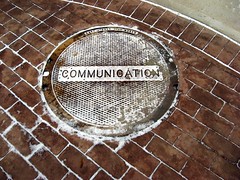If you are deaf or hard of hearing, you can read the transcript of this skit here.
In this classic comedy skit by comedy duo Abbott and Costello we witness the hilarity that can ensue from communication errors. Real life communication errors can also be funny and may even serve as a bonding moment between the parties involved. But communication errors can also cost us time, money and relationships.
Abbott assumes that he has established that the players have funny names. From this assumption he communicates that “Who” is on first base. Costello, however, did not understand the assumption and does not understand that “Who” is a funny name. Versions of “Who’s on First” are playing out across corporations today.
Leaders assume that they have “communicated” to their teams yet team members miss the objectives because they did not know they were given. Consumers are frustrated by instructions that fail to instruct on the basics and support lines buzz with complaints.
No one hits a home run on communications 100% of the time but you can reduce your failure rate and minimize errors when they occur with just a few simple steps.
- Assume nothing. Assumptions can get you into trouble when attempting to communicate. Whenever possible, check the understanding of your audience. In a live interaction, ask. If sending an email, simplify as much as possible and include explanation for items that may not be mutually understood. If you are preparing for a meeting, keynote or presentation, verify the depth of understanding in advance.
- Invite questions. Ask if there are questions but do so in a way that truly makes it comfortable for people to admit a lack of understanding. There is nothing worse than making someone feel bad for not “getting it.”
- Listen. Costello asked the question but Abbott was not really listening. It’s easy to become impatient when we are misunderstood but this heightens the error.
- Be patient. I once had a frustrating days long email exchange with a web designer about the color blue. I was working with a client and the web team was based in another country. I got up in the middle of the night to communicate real time and desperately tried to find a way to communicate I wanted blue. An example and a little more explanation finally bridged our communication gap. Ideally, I would have hashed it out by phone but that is not always possible. When I let go of the frustration, and focused on finding ways to be understood we quickly moved to resolution.
- Check Understanding. Confirm that the other party understood with simple check statements such as: To make sure we’re on the same page, let’s confirm what was discussed, Does that make sense to you?, I want t make sure I got everything, may I confirm what we talked about? You can do this in live conversation or via a quick confirmation email following a meeting.
Please feel free to share your tips, or feedback in the comments section. And if something was not clear, please do not hesitate to ask. 🙂









![Reblog this post [with Zemanta]](http://img.zemanta.com/reblog_e.png?x-id=63459b2b-79f0-4f2d-8846-7ead760f23e6)